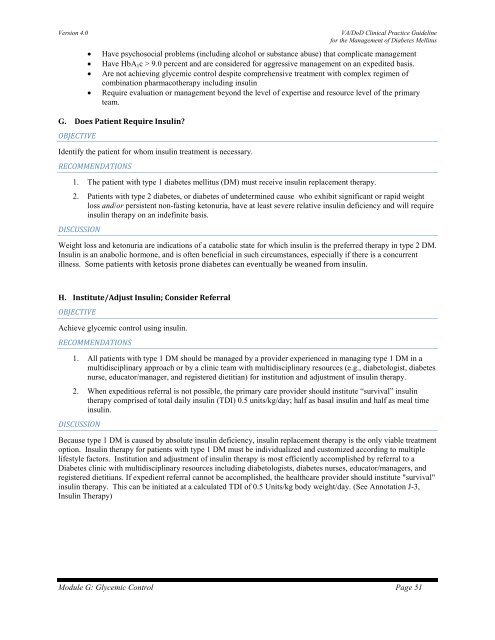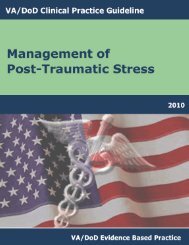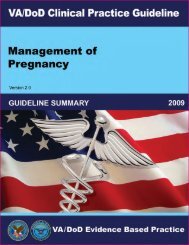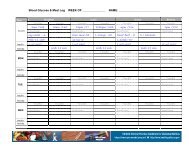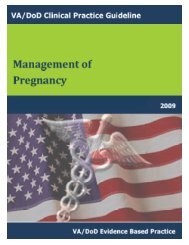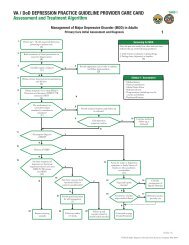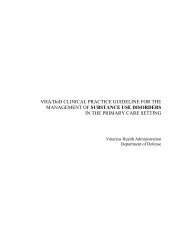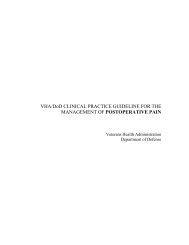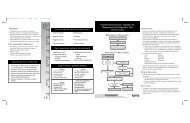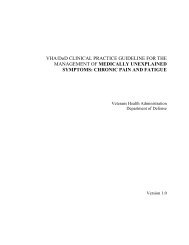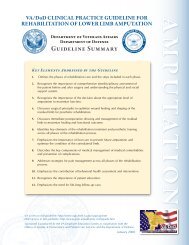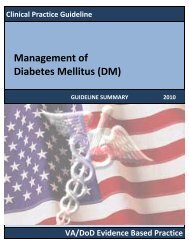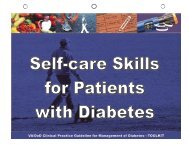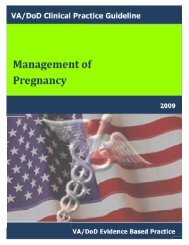DM Full Guideline (2010) - VA/DoD Clinical Practice Guidelines Home
DM Full Guideline (2010) - VA/DoD Clinical Practice Guidelines Home
DM Full Guideline (2010) - VA/DoD Clinical Practice Guidelines Home
You also want an ePaper? Increase the reach of your titles
YUMPU automatically turns print PDFs into web optimized ePapers that Google loves.
Version 4.0<br />
<strong>VA</strong>/<strong>DoD</strong> <strong>Clinical</strong> <strong>Practice</strong> <strong>Guideline</strong><br />
for the Management of Diabetes Mellitus<br />
• Have psychosocial problems (including alcohol or substance abuse) that complicate management<br />
• Have HbA 1 c > 9.0 percent and are considered for aggressive management on an expedited basis.<br />
• Are not achieving glycemic control despite comprehensive treatment with complex regimen of<br />
combination pharmacotherapy including insulin<br />
• Require evaluation or management beyond the level of expertise and resource level of the primary<br />
team.<br />
G. Does Patient Require Insulin?<br />
OBJECTIVE<br />
Identify the patient for whom insulin treatment is necessary.<br />
RECOMMENDATIONS<br />
1. The patient with type 1 diabetes mellitus (<strong>DM</strong>) must receive insulin replacement therapy.<br />
2. Patients with type 2 diabetes, or diabetes of undetermined cause who exhibit significant or rapid weight<br />
loss and/or persistent non-fasting ketonuria, have at least severe relative insulin deficiency and will require<br />
insulin therapy on an indefinite basis.<br />
DISCUSSION<br />
Weight loss and ketonuria are indications of a catabolic state for which insulin is the preferred therapy in type 2 <strong>DM</strong>.<br />
Insulin is an anabolic hormone, and is often beneficial in such circumstances, especially if there is a concurrent<br />
illness. Some patients with ketosis prone diabetes can eventually be weaned from insulin.<br />
H. Institute/Adjust Insulin; Consider Referral<br />
OBJECTIVE<br />
Achieve glycemic control using insulin.<br />
RECOMMENDATIONS<br />
1. All patients with type 1 <strong>DM</strong> should be managed by a provider experienced in managing type 1 <strong>DM</strong> in a<br />
multidisciplinary approach or by a clinic team with multidisciplinary resources (e.g., diabetologist, diabetes<br />
nurse, educator/manager, and registered dietitian) for institution and adjustment of insulin therapy.<br />
2. When expeditious referral is not possible, the primary care provider should institute “survival” insulin<br />
therapy comprised of total daily insulin (TDI) 0.5 units/kg/day; half as basal insulin and half as meal time<br />
insulin.<br />
DISCUSSION<br />
Because type 1 <strong>DM</strong> is caused by absolute insulin deficiency, insulin replacement therapy is the only viable treatment<br />
option. Insulin therapy for patients with type 1 <strong>DM</strong> must be individualized and customized according to multiple<br />
lifestyle factors. Institution and adjustment of insulin therapy is most efficiently accomplished by referral to a<br />
Diabetes clinic with multidisciplinary resources including diabetologists, diabetes nurses, educator/managers, and<br />
registered dietitians. If expedient referral cannot be accomplished, the healthcare provider should institute "survival"<br />
insulin therapy. This can be initiated at a calculated TDI of 0.5 Units/kg body weight/day. (See Annotation J-3,<br />
Insulin Therapy)<br />
Module G: Glycemic Control Page 51


